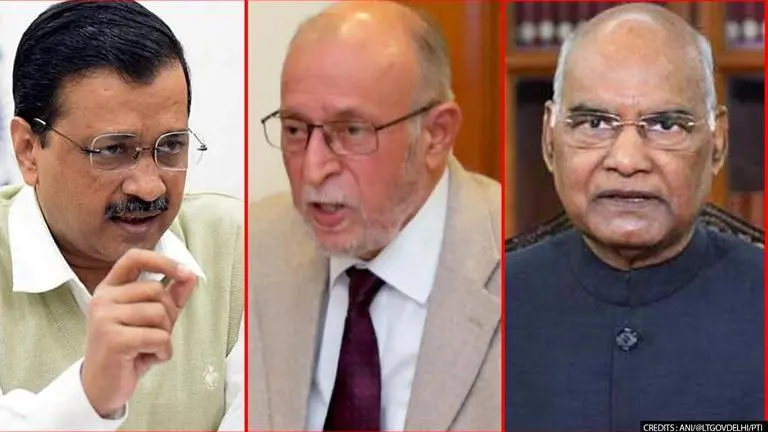Updated 28 March 2021 at 23:08 IST
President Kovind gives assent to GNCTD Bill as Opposition cries 'Assault on federalism'
In a blow to Delhi-based AAP, President Ram Nath Kovind on Sunday, gave his assent to the Government of National Capital Territory of Delhi (Amendment) Bill
- India News
- 3 min read

In a blow to Delhi-based AAP, President Ram Nath Kovind on Sunday, gave his assent to the Government of National Capital Territory of Delhi (Amendment) Bill, making it a law. President Kovind is currently admitted to AIIMS hospital and will undergo a planned bypass surgery on March 30. The GNCTD Bill which defines the powers of the Delhi Lieutenant Governor (LG), has been opposed by AAP, terming it 'murder of democracy'.
President consents to GNCTD Bill
Rajya Sabha passes GNCTD Bill
On Wednesday, Rajya Sabha passed the GNCTD Bill amid a walkout from opposition parties including Congress, SP, BJD, RJD and YSRCP. While 83 MPs voted in favour of the bill, 45 votes were cast against it. Though Congress and SP demanded that the bill should be sent to a Select Committee, BJD MP Prasanna Acharya opined that it undermines the authority of an elected government and Assembly. Amid multiple adjournments, the Upper House witnessed a war of words between AAP and the treasury benches. The Lok Sabha, where BJP has a single-party majority, passed the Bill on Monday.
What is the GNCTD amendment?
According to PRS, the Bill proposes to define the powers of the Delhi government and the L-G with regard to the 1991 Act, amending it:
- The term “government” referred to in any law made by the Legislative Assembly will imply Lieutenant Governor (LG)
- Assembly can make Rules to regulate it, consistent to Lok Sabha
- Bill prohibits Legislative Assembly from making rules for (i)day-to-day administration of the NCT, (ii) conduct any inquiry into administrative decisions
- LG must reserve Bills passed by Legislative Assembly for President's assent - (i) if it diminishes Delhi HC's power (ii) President may direct to be reserved (iii) deals with salaries of Speaker, Deputy Speaker, and members of the Assembly and the Ministers (iv) official languages of the Assembly. LG must also reserve those Bills for the President which cover any of the matters outside the purview of the powers of the Legislative Assembly.
- Executive action by the government must be taken in the name of the LG and his opinion must be obtained
AAP Vs Centre
Previously, in a 2019 Supreme Court judgement, Delhi government has been empowered to appoint special public prosecutors or law officers, fixing land revenue rates, the power to appoint or deal with the electricity commission or board. The SC also stated Delhi Anti Corruption Branch (ACB) cannot probe central government employees and that the Centre has the power to appoint Enquiry Commission. The SC has referred to the issue of transfers and posting of officers to a larger bench.
Advertisement
This has led to AAP accuse the BJP of 'giving LG power to stop work being done by the government elected by the people of Delhi' - leading to delay in schemes' implementation. In 2018, the SC had observed that the Delhi government need not obtain L-G’s concurrence on all governance issues, but only inform him. As of now law and order, and the police come under the Ministry of Home Affairs while administrative powers rest under the Delhi government.
Published By : Suchitra Karthikeyan
Published On: 28 March 2021 at 23:08 IST

